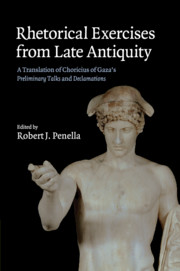 Rhetorical Exercises from Late Antiquity
Rhetorical Exercises from Late Antiquity Book contents
- Frontmatter
- Contents
- List of contributors
- Foreword
- Introduction
- I CHORICIUS, PRELIMINARY TALKS
- II CHORICIUS, DECLAMATIONS
- 2 Declamation 1 [X]:
- 3 Declamation 2 [XII]:
- 4 Declamation 3 [XIV]:
- 5 Declamation 4 [XVII]:
- 6 Declamation 5 [XX]:
- 7 Declamation 6 [XXIII]:
- 8 Declamation 7 [XXVI]:
- 9
- 10 Declamation 9 [XXXV]:
- 11 Declamation 10 [XXXVIII]:
- 12 Declamation 11 [XL]:
- 13 Declamation 12 [XLII]:
- Epilogue: The fortune and reception of Choricius and of his works
- Bibliography
- Index
7 - Declamation 6 [XXIII]: <The Miserly Old Man>
from II - CHORICIUS, DECLAMATIONS
Published online by Cambridge University Press: 29 January 2010
- Frontmatter
- Contents
- List of contributors
- Foreword
- Introduction
- I CHORICIUS, PRELIMINARY TALKS
- II CHORICIUS, DECLAMATIONS
- 2 Declamation 1 [X]:
- 3 Declamation 2 [XII]:
- 4 Declamation 3 [XIV]:
- 5 Declamation 4 [XVII]:
- 6 Declamation 5 [XX]:
- 7 Declamation 6 [XXIII]:
- 8 Declamation 7 [XXVI]:
- 9 Declamation 8 [XXIX]:
- 10 Declamation 9 [XXXV]:
- 11 Declamation 10 [XXXVIII]:
- 12 Declamation 11 [XL]:
- 13 Declamation 12 [XLII]:
- Epilogue: The fortune and reception of Choricius and of his works
- Bibliography
- Index
Summary
[THEME]
A wealthy miser had a son whom he wished to marry off to a rich but ugly girl. The young man rejected the arrangement. Meanwhile, there was a festival, and, in the course of it, the young man saw and fell in love with another girl, beautiful but poor. He applied to his father to be allowed to marry her, but failed in his request. War broke out. He became a war-hero and, being allowed by the laws to choose his reward, asked to be given the woman he loved. His father opposes his plea. Let us take the part of the miser.
EXPLANATORY COMMENT
[1] The old man in the declamation has also been possessed by love – not of a beautiful maiden (old age is usually chaste in such matters), but of a rich dowry. Even if he seems to be exhorting his son to behave well, even if he reproaches him with his passion for the girl, in fact every word he utters tends to the single goal towards which he has resolved from the beginning to direct his life. [2] This is why he thinks the rich girl preferable. Perhaps he does not even see that she is so ugly, because his understanding is blinded by his love of the dowry, so that, in the eyes of this miserly judge, poverty also diminishes the poor girl's beauty.
- Type
- Chapter
- Information
- Rhetorical Exercises from Late AntiquityA Translation of Choricius of Gaza's Preliminary Talks and Declamations, pp. 125 - 141Publisher: Cambridge University PressPrint publication year: 2009


